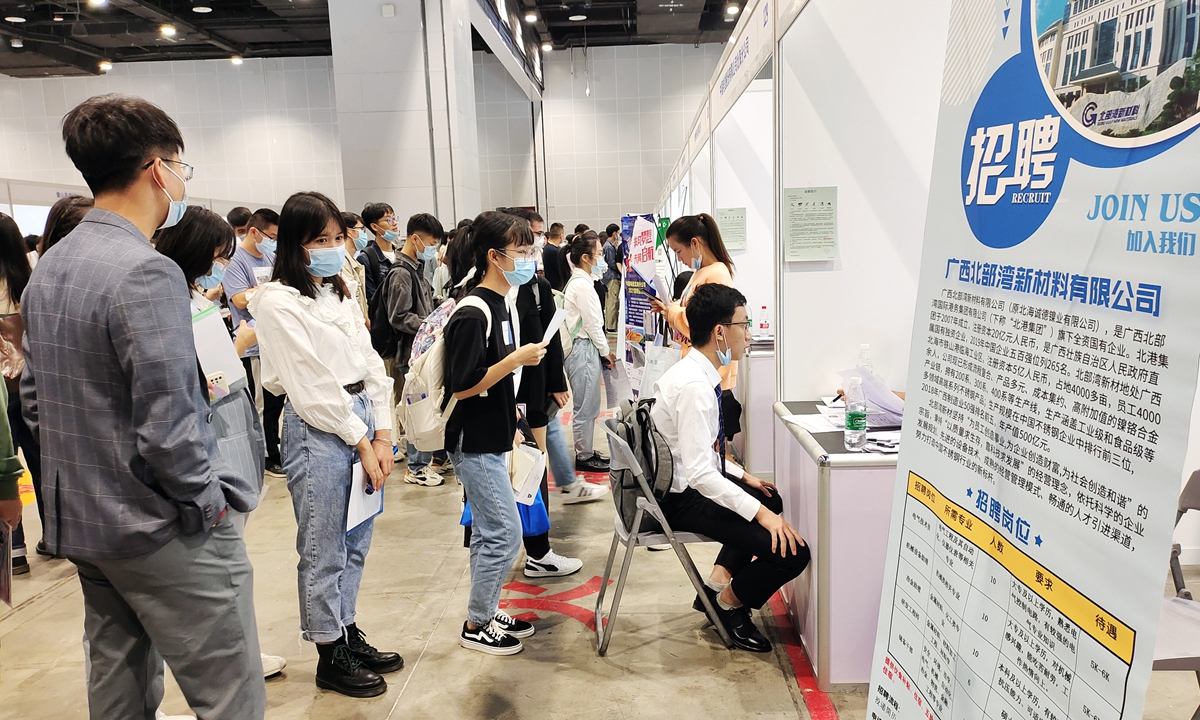College graduates in China to rise above 9 million in 2021 for first time
By Li Qiao Source: Global Times Published: 2020/12/15 0:12:03

A recruitment fair for college graduates for 2021 is held in South China's Guangxi Zhuang Autonomous Region on Sunday. At the fair, 350 companies offered 16,000 jobs to upcoming graduates. Photo: cnsphoto
More than 9 million college students are expected to graduate in 2021, but they will face a challenging employment environment amid the COVID-19 epidemic. Students should have a comprehensive understanding of the employment situation, and should not be blindly pessimistic or optimistic, experts said.
According to China's Ministry of Education, there will be more than nine million college graduates in 2021 for the first time, and more than 10 million in 2022, the Economic Daily reported on Monday.
The COVID-19 epidemic has hit the employment prospects for college graduates this year. However, Wu Aihua, deputy director of the College Student Affairs department under the Ministry of Education, recently revealed that according to the National Bureau of Statistics the employment situation for college graduates this year has been better than for those of last year as of September 1.
"The strong support for employment at the state level and the lower employment expectations among students mean that the employment situation is better than expected," Chu Chaohui, a research fellow at China's National Institute of Education Sciences, told the Global Times on Monday.
Qin Cong, a 21-year-old senior student of civil engineering at Shenyang Jianzhu University, Northeast China's Liaoning Province, has found a job in the construction industry.
"My job requirements are not high. I'm not looking for a real estate job but to work in a construction enterprise," Qin said.
Talking about the new opportunities for graduates, Chu said that as employment expectations decline, more basic jobs such as delivery of food and goods will absorb some college graduates.
With the continuous transformation and upgrading of industry, the science and technology sectors will continue to attract graduates. More graduates will choose to work in the central and western regions in China this and next year, due to the national policy bias and lower employment expectations, Chu noted.
Senior student Qian Tonghui, who majored in gardening at Northwest A&F University, Xianyang, Northwest China's Shaanxi Province, found the epidemic has had little impact on employment.
"Some basic job opportunities have increased. It is not too difficult to find a job with low requirements," Qian said.
Although Qian has not got an offer yet, she is confident in her employment after graduation.
However, 25-year-old Zhang Hao, who is in the last year of his master's degree at Shandong University, is low on confidence after unsuccessful interviews with private enterprises.
He said it is very hard to find a job because of the epidemic, and he is now considering a career as a civil servant.
Chu suggested that graduates should communicate with relevant enterprises as soon as possible, and they should concentrate on finding a job rather than holding out for the ideal position.
RELATED ARTICLES: